- 0086-571-85302990
- sales@greenskybio.com
What is natural grape seed extract? Definition, types, history and nutritional value.
2024-12-16

1. Introduction
Natural Grape Seed Extract has been gaining increasing attention in recent years due to its numerous potential health benefits. This extract is not just a simple by - product of the wine - making process but a valuable substance with a rich history and diverse applications.
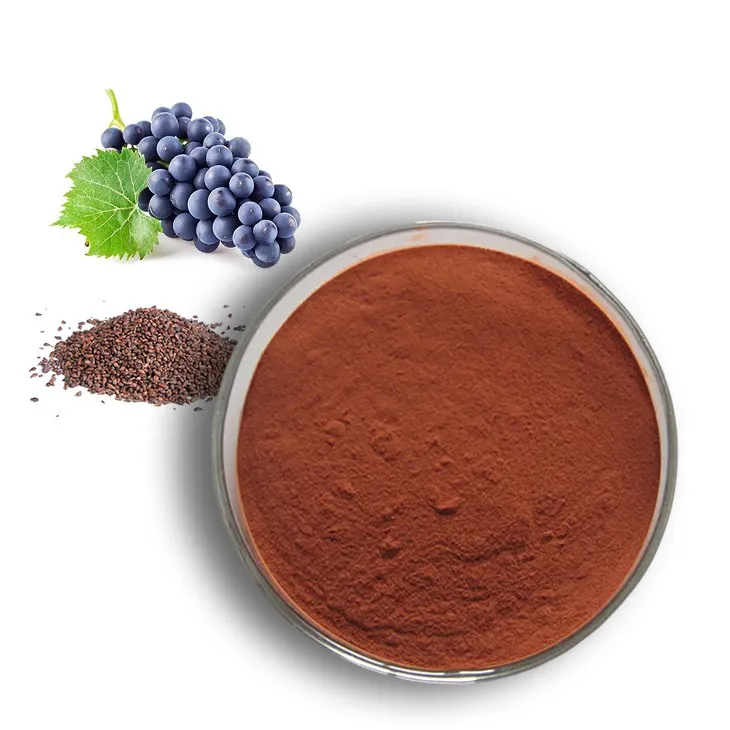
2. Definition
Natural Grape Seed Extract is a concentrated form of substances obtained from grape seeds. The extraction process is carefully designed to isolate and preserve the beneficial components present in the seeds. Grape seeds are a rich source of various bioactive compounds, and the extract aims to harness these elements in a more potent and accessible form.
These bioactive substances include polyphenols, flavonoids, and proanthocyanidins. Polyphenols are a large group of chemicals that have antioxidant properties. Flavonoids, a type of polyphenol, are known for their role in plant pigmentation and also have potential health - promoting effects. Proanthocyanidins are oligomers or polymers of flavan - 3 - ol units and are among the most important components in Grape Seed Extract, contributing significantly to its antioxidant capabilities.
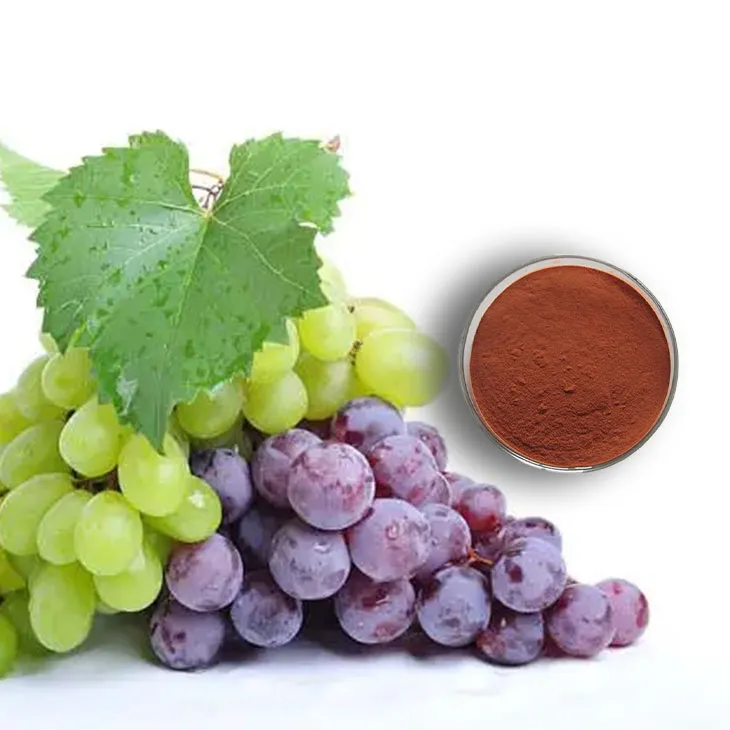
3. Types
3.1 Based on Grape Varieties
Different grape varieties yield grape seed extracts with varying chemical compositions. For example, Vitis vinifera, which is widely used in winemaking, can produce grape seed extracts with distinct characteristics. Red grape varieties, such as Cabernet Sauvignon or Pinot Noir, often have a higher content of certain antioxidants compared to white grape varieties. This is because red grapes typically have more phenolic compounds in their skins and seeds, which are transferred during the extraction process.
Another variety, Muscat grapes, may produce an extract with a different flavor profile and potentially different health - promoting properties. The unique genetic makeup of each grape variety influences the types and amounts of bioactive substances present in the grape seeds, ultimately affecting the properties of the resulting extract.
3.2 Based on Extraction Techniques
There are several extraction methods used to obtain grape seed extract, and these can result in different types of extracts. One common method is solvent extraction. Solvents such as ethanol or methanol are used to dissolve the bioactive compounds from the grape seeds. Extracts obtained using ethanol may have different characteristics compared to those obtained with methanol, as the solvent can interact differently with the various components in the seeds.
Another technique is supercritical fluid extraction. This method uses supercritical fluids, often carbon dioxide, which has properties between a gas and a liquid under specific conditions. Supercritical fluid extraction can produce a more pure and concentrated extract, as it can selectively extract the desired compounds while leaving behind unwanted substances. The resulting extract may have a higher antioxidant activity and a different chemical profile compared to extracts obtained by solvent extraction.
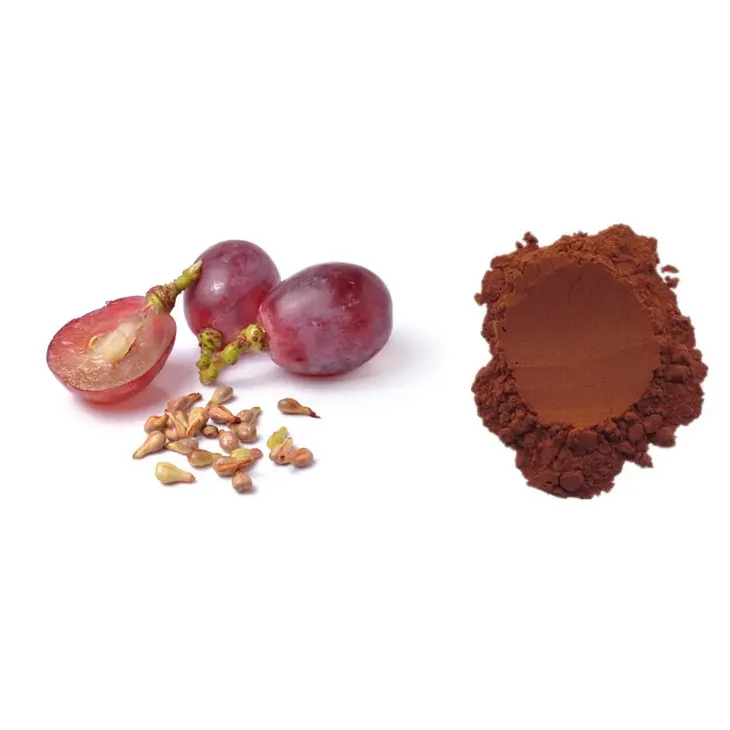
4. History
The relationship between grapes and health has been recognized since ancient times. The ancient Greeks and Romans were aware of the medicinal properties of grapes and used them in various forms for treating ailments. Grapes were not only consumed as fruits but also used in the form of wine, which was believed to have certain health - promoting effects.
However, the scientific study of grape seed extract is a relatively modern development. In the 20th century, with the advancement of scientific research techniques, scientists began to take a closer look at the components present in grape seeds. Initial research focused on the antioxidant properties of grape seed extract, and as more studies were conducted, a broader understanding of its potential health benefits emerged.
In recent decades, the popularity of grape seed extract has grown significantly, both in the field of health and wellness and in the cosmetic industry. It has been incorporated into dietary supplements, skincare products, and functional foods, as more and more evidence supports its various beneficial effects.
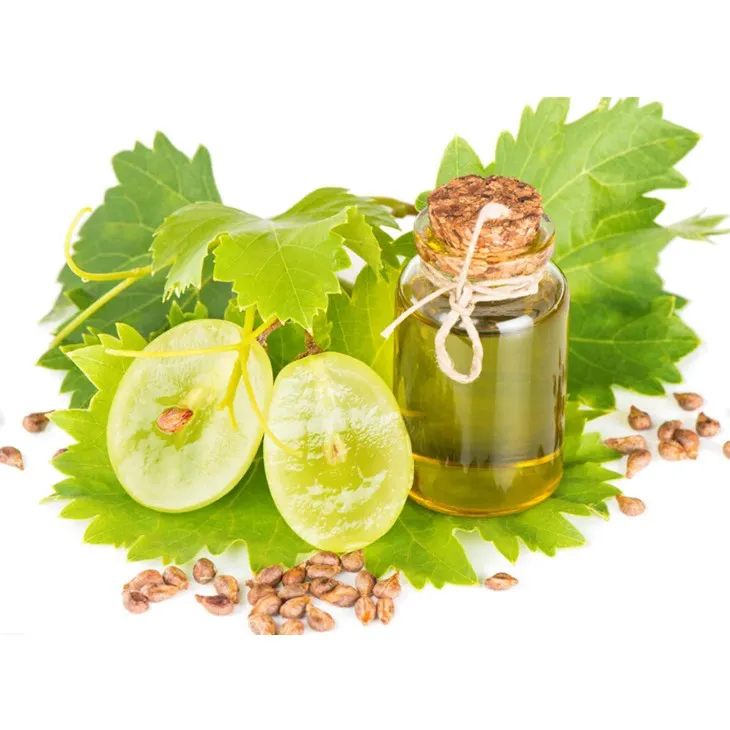
5. Nutritional Value
5.1 Antioxidant Properties
One of the most significant aspects of Natural grape seed extract's nutritional value is its antioxidant content. Antioxidants play a crucial role in maintaining the health of cells in the body. They work by neutralizing free radicals, which are highly reactive molecules that can cause oxidative damage to cells. Oxidative damage is associated with a variety of health problems, including heart disease, cancer, and neurodegenerative disorders.
Grape seed extract contains a high concentration of proanthocyanidins, which are powerful antioxidants. These proanthocyanidins can scavenge free radicals more effectively than many other antioxidants, such as vitamin C and vitamin E. By reducing oxidative stress, grape seed extract may help to protect cells from damage, improve the function of the immune system, and potentially slow down the aging process.
5.2 Impact on Digestion
Grape seed extract may also have a positive impact on digestion. It has been shown to promote gut health in several ways. Firstly, it can help to maintain the integrity of the intestinal lining. The intestinal lining acts as a barrier, preventing harmful substances from entering the bloodstream. Grape seed extract can strengthen this barrier, reducing the risk of "leaky gut" syndrome.
Secondly, it may have prebiotic - like effects. Prebiotics are substances that stimulate the growth of beneficial bacteria in the gut. By promoting the growth of these bacteria, grape seed extract can help to improve the balance of the gut microbiota, which is essential for proper digestion and overall health. A healthy gut microbiota can also enhance the absorption of nutrients from food, further contributing to good health.
5.3 Potential Role in Weight Management
There is some evidence to suggest that grape seed extract may play a role in weight management. One way it may do this is by influencing the body's metabolism. Grape seed extract has been shown to increase the activity of certain enzymes involved in fat metabolism, such as lipase. By increasing lipase activity, it can help the body to break down fat more efficiently.
Additionally, its antioxidant properties may also be relevant in weight management. Oxidative stress has been associated with obesity, and by reducing oxidative stress, grape seed extract may help to regulate the body's weight. However, more research is needed to fully understand the relationship between grape seed extract and weight management.
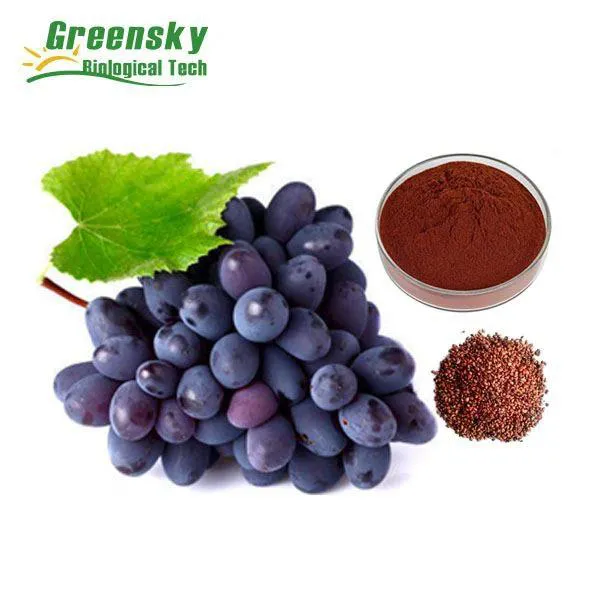
6. Conclusion
Natural grape seed extract is a fascinating substance with a diverse range of properties. Its definition encompasses a concentrated form of bioactive compounds derived from grape seeds. There are different types of extracts, depending on grape varieties and extraction techniques. Its history dates back to ancient times, with modern science uncovering its many potential health benefits. Nutritionally, it offers significant antioxidant value, has a positive impact on digestion, and may potentially aid in weight management. As research continues, we can expect to gain even more insights into this valuable extract and its applications in promoting health and well - being.
FAQ:
What are the main bioactive substances in Natural grape seed extract?
Natural grape seed extract contains a variety of bioactive substances. The main ones are antioxidants, such as proanthocyanidins. It may also contain phenolic acids and other compounds. These substances contribute to its various beneficial effects on health.
How does the extraction method affect the types of natural grape seed extract?
Different extraction methods can lead to variations in the chemical composition of the extract. For example, some extraction techniques may be more efficient at isolating antioxidants, resulting in a type of extract that is rich in these substances. The choice of solvent, extraction time, and temperature can all influence the final product. Grape variety also plays a role, as different grapes may have different levels of bioactive compounds. Thus, the combination of grape variety and extraction method determines the type of natural grape seed extract.
Can natural grape seed extract really help with weight management?
There is potential for natural grape seed extract to aid in weight management. Some studies suggest that its antioxidant properties may play a role in metabolism regulation. Additionally, it may have an impact on gut health, which is related to overall body weight. However, more research is needed to fully understand the mechanisms and the extent of its effect on weight management.
What is the role of antioxidants in natural grape seed extract for cellular health?
Antioxidants in natural grape seed extract are crucial for cellular health. They prevent oxidative damage to cells. Oxidative stress can cause damage to cellular components such as DNA, proteins, and lipids. By neutralizing free radicals, the antioxidants in grape seed extract help maintain the integrity of cells and protect them from premature aging and damage, which is associated with many diseases.
How has the understanding of natural grape seed extract evolved over time?
Initially, the relationship between grapes and health was recognized in ancient times. However, it was only in modern times with the development of scientific research methods that the specific properties of grape seed extract began to be explored in detail. Early research focused on its antioxidant properties, and over time, more research has been conducted to understand its other potential health benefits, such as its impact on digestion and potential role in weight management.
Related literature
- The Antioxidant Properties of Grape Seed Extract: A Review"
- "Grape Seed Extract: From Ancient Remedy to Modern Nutraceutical"
- "Nutritional and Health - Promoting Effects of Grape Seed Extract"
- ▶ Hesperidin
- ▶ citrus bioflavonoids
- ▶ plant extract
- ▶ lycopene
- ▶ Diosmin
- ▶ Grape seed extract
- ▶ Sea buckthorn Juice Powder
- ▶ Beetroot powder
- ▶ Hops Extract
- ▶ Artichoke Extract
- ▶ Reishi mushroom extract
- ▶ Astaxanthin
- ▶ Green Tea Extract
- ▶ Curcumin Extract
- ▶ Horse Chestnut Extract
- ▶ Other Problems
- ▶ Boswellia Serrata Extract
- ▶ Resveratrol Extract
- ▶ Marigold Extract
- ▶ Grape Leaf Extract
- ▶ blog3
- ▶ blog4
- ▶ blog5
-
Pure 85% Tomentil Extract.
2024-12-16
-
Passionflower Extract
2024-12-16
-
Phellodendron Extract
2024-12-16
-
Propolis Extract Powder
2024-12-16
-
Centella Asiatica Extract
2024-12-16
-
Grape Leaf Extract
2024-12-16
-
Saffron Extract Powder
2024-12-16
-
Ivy Extract
2024-12-16
-
Curcuma Longa Extract
2024-12-16
-
Bitter Melon Extract
2024-12-16
-
Eucommia Ulmoides Extract
2024-12-16





















